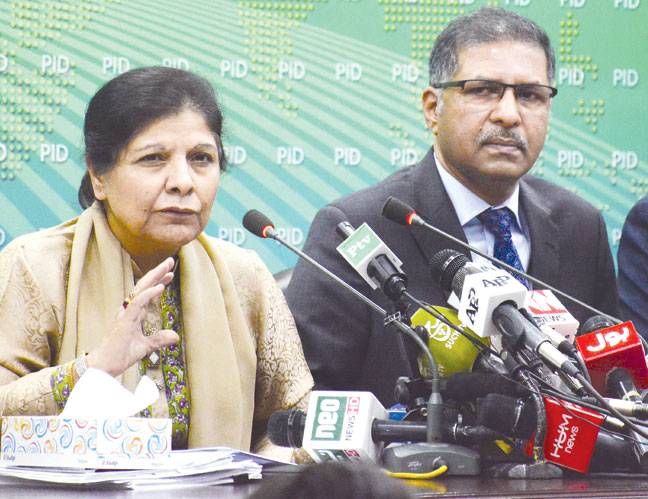ISLAMABAD - The caretaker government said Tuesday that it was facing economic challenges at external as well on domestic fronts as it would miss the targets of budget and current account deficits by a wide margin during outgoing fiscal year (FY2018).
“The economy shows mixed picture, as the real sector is dynamic and vibrant. Some sectors of the economy are doing well as GDP is strong at 5.8 percent during outgoing fiscal year,” said caretaker Finance Minister Dr Shamshad Akhtar along with Federal Minister for Information and Broadcasting Syed Ali Zafar. She once again clarified that incumbent government would not approach International Monetary Fund (IMF) for new loan programme.
Giving details of the economy, the minister said inflation was currently under control, which may increase due to rising oil prices and impact of rupee depreciation against dollar. Every sector, including agriculture and services, made a substantial growth. She further said there were some daunting economic challenges including widening of current account deficit (CAD). The CAD has already widened to $14.03 billion during 10 months (July to April) of the FY2018 as against the full year’s target of $8.9 billion. She said CAD was widening due to massive increase in imports as against exports, which were slowed down in last few years. The widening of CAD was depleting foreign exchange reserves, which was major worry for the incumbent government as it was for the previous government, she added.
Finance Minister further revealed that government would also miss the budget deficit target of 4.1 percent of the GDP (Rs1.48 trillion) during FY2018. The deficit is likely to increase to 6.1 percent of the GDP (Rs2.2 trillion) mainly due to expected shortfall in revenues. She informed the media that Pakistan’s public debt had ballooned to 70 percent of the GDP as against 64 percent of the GDP of 2013.
Talking about the current rupee depreciation, Dr Shamshad said that government would not intervene in it, as the market forces would determine the rupee value. The exchange rate was stable for long time. “The market should be allowed for self-correction”. The dollar value on Tuesday increased to Rs122.5 in open market. The minister said that rupee depreciation enhances country’s exports and discourages imports.
The caretaker government once again clarified that it would not approach IMF for fresh bailout package. “No formal or informal talks will be held with IMF for new loan programme”. However, the government would hold technical talks with local as well as foreign institutes for framing medium term macroeconomic framework. She clarified that caretaker government would honour the payment of debt liability.
“We have to pay those loans, which are due but it is not easy to find the ways.”
Finance Minister also clarified that incumbent government had increased the prices of petroleum products according to the previous practices, which were followed since last many years. The previous PML-N government on the last date of May had deferred the POL price’s increase till midnight June 7 and left the matter for the caretaker set-up to make the final decision on it. However, the interim government yesterday decided to increase the oil prices for rest of the month due to its fiscal impact. The caretaker government has decided to pass only a partial impact of increase and the government will absorb 50 per cent of impact of increase effective from June 12. The impact of absorbing 50 percent would be Rs9 billion, she added. Dr Shamshad said that petrol price was low in Pakistan as against other countries of the region. Petrol price in Pakistan was Rs91.96 per litre, which was Rs140.42 in India.
Earlier, Federal Minister for Information and Broadcasting, Barrister Ali Zafar, who is also having additional charge of Ministry of Power, said that power situation will improve in next few days. Electricity demand and supply gap will almost be zero in the current month (from June 15 to June 30). He was optimistic that power generation will increase next month and load-shedding will totally be controlled.
He gave detailed briefing on the power situation, which deteriorated in first week of June when caretaker government took charge. He held three factors responsible for previous loadshedding including severe shortage of water in dams that reduced the power production to 3,000 megawatt from 6,000MW of last year. Similarly, there were technical faults in Port Qasim and Baloki power stations, which reduced power supply of 2300MW. However, he said, that situation had improved currently, as water level in dams had increased after rains and the technical faults in the plants had been removed. He said at present 21,000 to 22000MW of electricity was being produced against the demand of 23,000 to 24,000MW, causing a shortfall of 2000MW. He said the country had a total installed capacity of 28,000MW.
He vowed that caretaker government would fully support the Election Commission to hold free, fair and peaceful elections. Similarly, the interim government will make no compromise on security of the country and take all necessary decisions in the best national interest. “The government will perform its responsibilities according to its constitutional mandate without indulging into any blame game,” he said and added that caretaker government will leave guidelines for the upcoming elected government to follow them if it desire.






